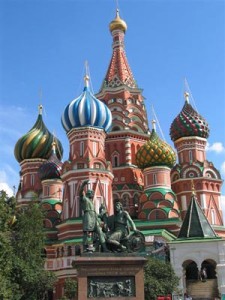
With the final of the 2009 Eurovision Song Contest coming up, we finish our history about the host city, Moscow. We left Moscow as a city haunted by war, plague and riots. But a new threat to the city’s glory was soon to arrive.
Peter the Great wanted Russia to move forward and become a more western country, so he founded the city of Saint Petersburg on the Baltic coast in 1712. In the years that followed, Saint Petersburg became the centre of not only the Royal family, but also the political life in the country.
Moscow experienced a decline in influence, but its name was still a strong brand, and a golden target for invaders.
In France, the emperor Napoleon looked with envious eyes to the east. After overrunning most of Europe, he wanted to capture the Russian crown, so he ordered his “Grand army” to attack the country in 1812. With himself in front, the French troops arrived at the city gates of Moscow in late autumn, just to find the city deserted and burnt down, leaving nothing to the invaders. When the winter came, with temperatures down to –30 degree celsius, the ‘grand army’ had to flee back to western Europe. Most of Napoleon’s army died, and three years later, after Waterloo, Napoleon was history.
Moscow was rebuilt again, and enjoyed a relatively quiet period until a tornado hit the city on the 29th June 1904, destroying about 3000 houses. Loss of life was not reported due to censorship because of the war against Japan, a war Russia lost, giving the Japanese the feeling that they could rule the world. A feeling that ended in 1945.
The Russia that took part in the First World War (1914-1918) was, for most Russians, a poor and underdeveloped country ready for a revolution. Lenin and his communist red army took over power after a bloody civil war, in which the Royal family was executed, and Moscows role as the capital was restored.
In 1933, the biggest threat, not only to Moscow, but to the whole world, came to power in Germany. His name was Adolf Hitler. He and his Nazi regime started the Second World War (1939-1945) when they attacked Polend, and soon Europe had fallen to his army, leaving Great Britain alone in the fight, with Soviet Russia.
On the 22nd June 1941, more than 3 million German soldiers invaded the Soviet Union, rushing towards Leningrad (Saint Petersburg) and Moscow. Quickly, the western parts of the country were overrun, and in the beginning of winter, Leningrad was surrounded But the city fought back, and for 900 days, Leningrad was under siege, until it was relieved by the red army.
One million German soldiers attacked Moscow when the first snow started to fall. The Soviet leader Stalin ordered factories to move east, but he and his government stayed in the Kremlin. The population was mobilised and troops brought in from the east. General Zhukov was appointed leader of the defence, and the Red army won a clear victory that winter, giving hope to the world that Nazi Germany could be beaten.
In January 1943, Zhukov’s army wiped out the whole German 6th Army at Stalingrad, and it was also Zhukov who led the army that captured Berlin in May 1945.
Moscow hosted the Olympic Games in 1980, games that were boycotted by several western countries due to the Soviet invasion of Afganistan. It was the “last hurrah” from the communist regime. Soviet Russia had brought itself to a political and financial standstill. Even though Mikhail Gorbachev tried to open up with his Glasnost and Perestroika, the communist regime fell in 1991.
The Russian transformation from communism to a free market has not been without trouble, but it seems like a new dawn for that great country and its capital, Moscow, is just around the corner.




















